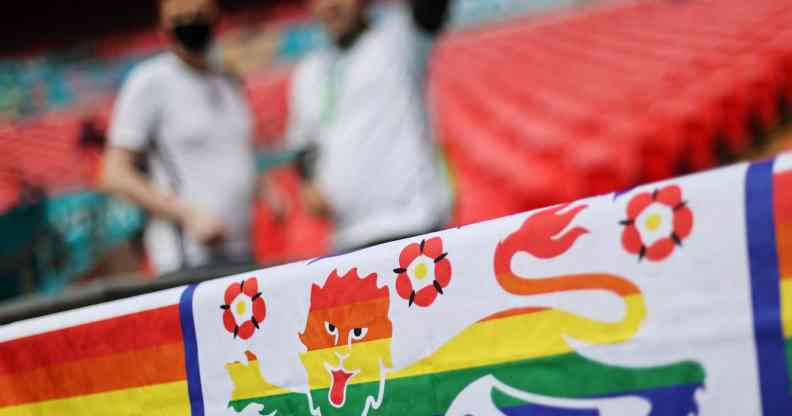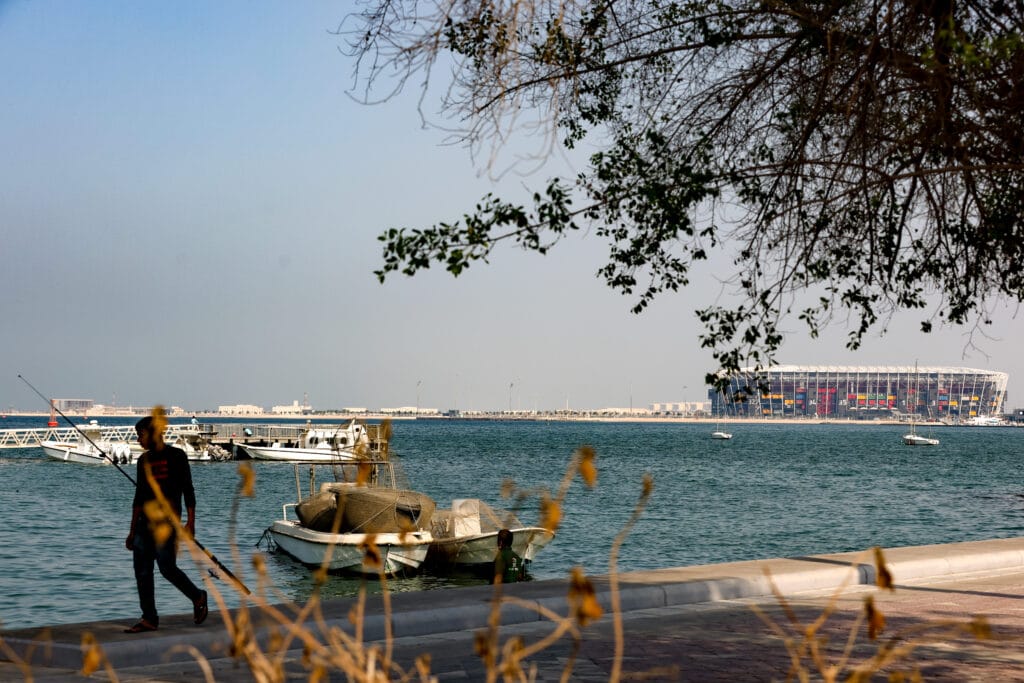LGBT+ football fans ‘will be welcome’ in Qatar for World Cup, FA insists as criticism mounts

As football pitches up in Qatar, the nation’s anti-LGBT+ laws have become a hot-button issue. (Carl Recine – Pool/Getty Images)
LGBT+ football fans “will be welcome” at next year’s World Cup in Qatar, England’s Football Association chief has insisted.
Qatar, chief executive Mark Bullingham said, has made “strong progress” in addressing a raft of human rights issues that have battered FIFA.
The 2022 World Cup will be the first one held in the Arab world and has been a hot-button issue since Qatar won the hosting rights in 2010.
Among them in the last decade of controversy and scandal: accusations of corruption, the cost, the emirate’s treatment of migrant workers, women and LGBT+ people.
But for queer football fans, they will apparently have nothing to fear in the Gulf state that sees their existence as illegal. Punishments include jail time, flogging and death.
Bullingham visited Qatar to better understand the issue, he said at a press conference Monday (22 November), and claimed to have “been given those assurances that people from the LGBT+ communities will be allowed to go to Qatar and support the [England] team”.
The 2022 World Cup, Bullingham hopes, will be a catalyst for change in Qatar.
“We have asked the question as to whether all of our fans will be able to come, particularly those from LGBTQ community,” he said, “and we received the unequivocal answer that absolutely everybody is welcome to come to Qatar.”
Football boss feels Qatar has made ‘strong progress’ ahead of World Cup
In June, UEFA organised a working group to examine Qatar’s human rights track record.
European football’s top governing body met with various bodies, including the International Labour Organisation, the National Human Rights Committee, the Qatar Football Association, before visiting the Ras Abu Aboud Stadium.
Bullingham was a member of the group, meeting with migrant workers and charities to capture what is happening on the ground.
“We believe the legislation the Qataris have brought in over the last few years has been strong progress from a fair low base,” he said.

The Ras Abu Aboud Stadium, the host venue for the Qatar 2022 FIFA World Cup in Doha. (Matthew Ashton – AMA/Getty Images)
In Qatar, labour laws are based on the “kafala” system. Described by Amnesty International and Human Rights Watch as exploitative and abusive, it sees employers sponsor foreign workers.
As unskilled workers often pay fees worth a year’s salary to labour recruiters in their homelands to score jobs in Qatar.
Many land in debt only to be hired in jobs that pay far less than advertised. They cannot simply leave the jobs, however, as their employers under the scheme must give them permission to do so.
At least 6,500 migrant workers have died since the World Cup was awarded in 2010 to Qatar, The Guardian reported in February.
The tiny oil-rich Persian Gulf nation rejigged the labour system amid an international outcry and rolled out worker safeguards and a minimum wage.
Yet, as much as Qatar has taken some steps to change, Bullingham said that the pace remained slow.
“What is very clear, though,” he said, “is that the legislation isn’t being applied universally, and that has to be the next step, and that’s where we see the real progress will come through.”
But little commitments to change have been made when it comes to LGBT+ rights, with Formula One racing champ Lewis Hamilton recently wearing a rainbow crash helmet in protest against Qatar’s anti-queer laws.
Overall, Qatar has scrambled to rewrite its image with publicity-boosting sports events and even signing up footballer David Beckham to become the “face of Qatar” for the next decade.
Nevertheless, under Sharia law, gay Muslims in Qatar can face three years imprisonment or even the death penalty.
Although, activists say there are no known cases that the death penalty was enforced for homosexuality.
In response to the seething, years-long criticism for its anti-LGBT+ laws, Qatar said that it would allow LGBT+ Pride flags in World Cup 2022 stadiums.
“What it doesn’t do is help the LGBTQ+ community,” Chris Paouros, a member of the English Football Association’s inclusion advisory board, said at the time.
“It’s great for us to be able to go and put our flags up in the stadium, and that’s wonderful during a World Cup. You want it to be the festival of football.
“But ultimately we do the work because we want to make sure that everybody can be free to be who they are and if you’re a Qatari and you’re not able to, then it just feels like window dressing.”

